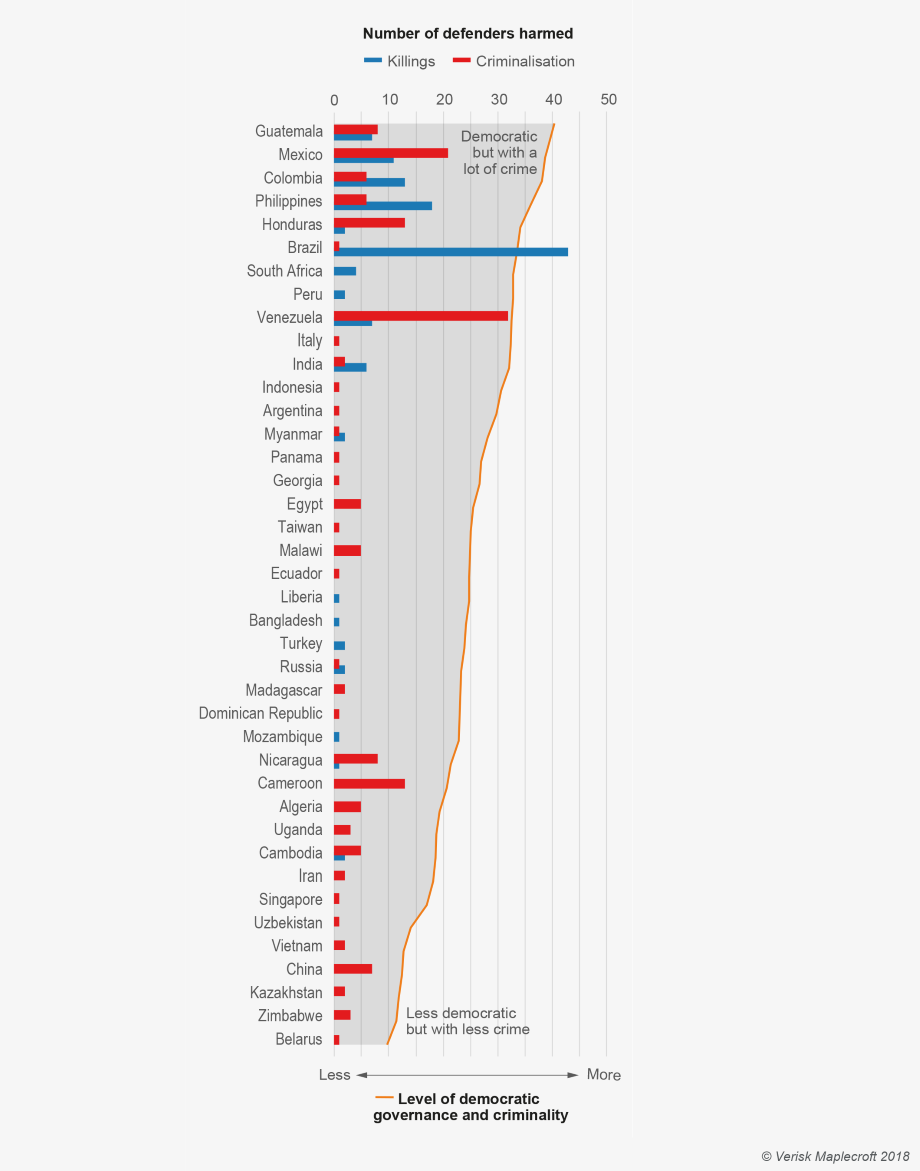In the second instalment of our annual Human Rights Outlook, we explore evidence of rising attacks against human rights defenders – many of which are linked to land rights – that have spurred new UN guidance which will put the spotlight on business to take action.
- Human rights defenders are increasingly at risk – over the last four years, there has been a 13-fold rise in those reported killed
- Better monitoring of such attacks is increasing information about the potential links between business activities and the killing or criminalisation of people who are defending human rights
- New UN guidelines will up the pressure on business to take steps to ensure defenders campaigning against their activities are not harmed or criminalised
Issue
In the last five years, a growing number or organisations have collected information about the killing and criminalisation of human rights defenders – individuals who protect and promote human rights – and their data shows that more defenders are being harmed every year. When the NGO Frontline Defenders first started monitoring cases in 2012, it reported 24 killings; in 2017, the number of killings reported had risen to 312, a 13-fold increase.
As better data is shared, we discover more about the issues or sectors that defenders were campaigning about when they were harmed. We know that most defenders killed are campaigning against business impacts on land – between 2015 and 2017, approximately two-thirds of defenders killed were campaigning about land rights. We also know that about one third of companies linked in reports to these killings have HQs in the US, UK, Canada and Australia, all countries where business is subject to human rights compliance. Richer data is tightening the business connection to a defender’s fate. That puts a company’s reputation on the line both locally and internationally.
Challenges and opportunities
In 2017, the UN Special Rapporteur on Human Rights Defenders clarified that business has an obligation to ensure that defenders can effectively and safely address the human rights impacts linked to business operations. Guidance as to how to achieve this will be set out by the UN Working Group on Business and Human Rights following a consultation this year. Early adoption of these guidelines will be crucial for industries such as mining, timber and agribusiness that have large land footprints – especially in Brazil, Colombia, Mexico and the Philippines, where 80% of defender killings occurred in 2017. The guidelines will also be important for ICT firms, given that their platforms are so intricately linked to the exercise of civic freedoms. Defenders who are criminalised in the courts – a strategy used more frequently than killing – are most often campaigning about civil and political rights.
Explaining the data
The figure above compares data from our criminality and democratic governance indices with incidents of killing or criminalisation. This shows that defenders are most likely to be killed in countries that are democratic but under pressure from strong criminal networks, such as Brazil, Colombia and the Philippines. While defenders in these countries are free to campaign about their rights, weak rule of law fails to protect them.
We also find that in states that are less democratic but relatively free from criminality, defenders are more likely to be criminalised through unfair trials and arbitrary imprisonment. In these countries, such as Vietnam and Cambodia, strong rule of law is misused to imprison or harass defenders.
The figure below illustrates how strategies to silence or control human rights defenders, and the issues they campaign about, vary across regions. It shows that when defenders are killed, they are more likely to be campaigning about economic, social and cultural rights, especially land rights; when criminalised, they are more often defending civic freedoms.
Spotlight
The consultation led by the UN Working Group highlights the following ways in which businesses can mitigate risks to human rights defenders:
- Identify risks to defenders: Assess respect for civic freedoms by identifying gaps between international standards and national laws, and by asking defenders about the risks they face when defending human rights.
- Apply leverage: Use the information gathered to engage with state authorities and suppliers to enable a safe environment for defenders.
- Treat defenders as partners: Engage defenders early on and consult them to better understand the business’s social impacts.
Key issues covered by our Human Rights Outlook include:
- Automation
Rise in worker exploitation predicted as robots revolutionise jobs market - Compliance
Despite multiplying laws and standards, a common approach is emerging - Certification
Collaboration is key to make schemes more effective and rebuild confidence - Social impacts
Investor community expects business to up its game

